 |
 |
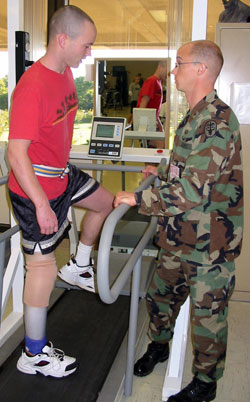
|
|
Matthew Scherer, Physical Therapist, Medical Specialist Corps (SP), United States Army, Walter Reed Army Medical Center, Washington D.C.
|
1. I chose this career because...
2. My typical workday involves...
3. What I like best/least about my work...
4. My career goal is...
5. When I'm not working, I like to...
6. In praise of a liberal arts program...
|
|
1. I chose this career because...
|
Back to Top

|
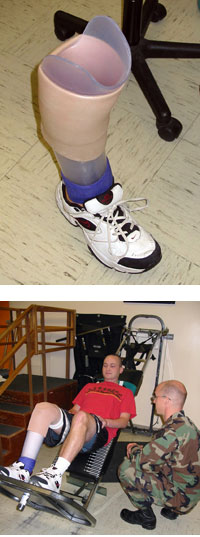
|
|
Matthew Scherer uses weight-bearing equipment to help a patient strengthen his leg muscles.
|
I chose to become a physical therapist because I wanted to promote wellness and spend time treating and interacting with my patients.
Growing up, I always had an interest in science. I was greatly influenced by my parents. They pushed for achievement in academics and provided a good example of diligent work ethics. As I approached college, I had an interest in natural sciences and in medical school. However, I did not want a long period of schooling, as necessary with medical school. I wanted to promote wellness and work with patients sooner, rather than later. I thought that physical therapy might be in my future.
Undergraduate Education
I searched for a liberal arts college with a Reserve Officers’ Training Corps (ROTC) program so that I could fund my education and broaden my horizons. I reached my goal at Gustavus Adolphus College where I majored in geology and philosophy. I tried to balance my coursework between hard science and the humanities so I could cultivate skills in lab science and in writing, speaking and critical thinking. At Gustavus Adolphus, my education helped me become a good generalist and set the stage for my continued professional development.
Peace Corps Service
Upon graduation, I accepted a commission as a quartermaster officer in logistics, and spent 4 years of active duty with the 10th Mountaineer Division in up-state New York. Then I left active military service and joined the Peace Corps with my wife. We were sent to Surinam, South America, where we spent 27 months working with descendents of West African slaves in a small interior village. In the community, we facilitated micro-projects involving potable water sources, public health and sanitation services, and teaching English and informal heath education.
Graduate Education
Upon completion of my Peace Corps service, I still had physical therapy on my mind and decided to apply to the Army-Baylor Physical Therapy Program. My undergraduate program only provided 2 of the 10 classes needed for the program. To complete the necessary application requirements, I began pre-requisite coursework at a number of local universities. The Baylor program compressed the normal 3 years of academic coursework into 18 months. I began intense training to care for active duty military service members and their families. While much of my training emphasized orthopedics and treatment of overuse injuries, I also received training in neurological, cardiopulmonary and amputee rehabilitation.
Post Graduate Assignment
Upon completion of my master’s degree in physical therapy, I was assigned to Walter Reed Army Medical Center as a staff therapist. New opportunities and training became available, and I cultivated an interest in neurological rehabilitation. Neurological rehabilitation emphasizes the treatment of central nervous system dysfunction, or injuries such as traumatic brain injuries, stroke, cerebral palsy, and spinal cord injuries. To date, I have had many opportunities to enhance my clinical expertise through additional training including two courses in amputee rehabilitation, the Emory University Vestibular Rehabilitation course (for treatment of chronic dizziness and vertigo), treatment of the spine and low back pain, life guard certification, and deployment specific patient management and management of traumatic brain Injuries. My Walter Reed experience promises to enhance my skills and abilities before I am assigned to another tour of duty at a different military location.
Education
- Bachelor of Arts, Geology, Philosophy, Gustavus Adolphus College, St. Peter, Minneapolis
- Master of Science, Physical Therapy, United States Army-Baylor University, San Antonio, Texas
|
|
2. My typical workday involves...
|
Back to Top

|
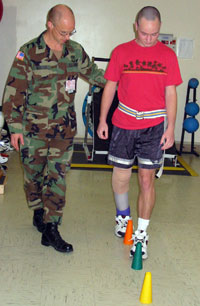
|
|
Matthew Scherer uses cones to help a patient increase strength and improve coordination.
|
My typical workday at the Walter Reed Hospital is a long day involving the duties of an Army officer, patient responsibilities in the clinic, administrative tasks, personal physical fitness and leadership.
Typical Schedule
- My day begins with a workout in the gym and physical training, which is required by the Army.
- At 7 AM, on Monday and Thursdays, I evaluate outpatient ambulatory patients, and evaluate and treat primarily active duty military personnel.
- At 9 AM, I begin work with patients in the amputee service, dealing largely with the war-wounded who have lost limbs due to blast injuries incurred overseas. Together we work to improve their gait, balance, and general conditioning. Each patient works about 3 hours per day on rehabilitation, including time with an occupational therapist. Our goal is to have the patient return to the physical condition they had before they were injured.
Additional Roles
Officer in Charge - Gym, Pool and Functional Programs
- In the gym, the treatment includes resistance training and cardiovascular conditioning.
- In the pool, the treatment involves cardiovascular training, non-weight bearing activities, aquatic jogging, and lumbar stabilization to relieve back pain.
- The functional program deals primarily with outpatients. It provides them with the opportunity to play wheelchair basketball, volleyball, rugby and winter/summer sports such as skiing and water sports. The patients are able to take part in workshops run by Para Olympians to increase their skills. Due to these activities, the military has become a clearinghouse for information for organizations such as the Disabled Sports USA and the Achilles Track club. They give the patients the option to learn how to participate in wheelchair racing, water sports, skiing, climbing and running.
Assistant Section Chief - Amputee Rehabilitation Service
- As such, I am responsible for putting together standard operating procedures and patient care systems.
Peer Review Coordinator For Documentation
- In this role, I must be sure that our section is in compliance with the Joint Commission on Accreditation of Healthcare Organizations (JCAHO). JCAHO’s goal is to evaluate each healthcare organization's compliance with established standards, and identify the organization's strengths and weaknesses. Their goal is not merely to find problems, but also to provide education and consultation so healthcare organizations can improve. The JCAHO is committed to assuring the American public of quality healthcare.
|
|
3. What I like best/least about my work...
|
Back to Top

|
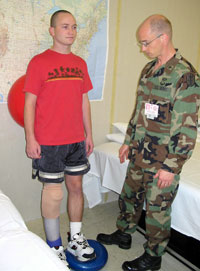
|
|
Matthew Scherer guides a patient through a balance exercise.
|
What I like best about my work is to see the patients make progress toward their goals and improve their level of functional activity. As the patient progresses toward independence, I feel a tremendous sense of accomplishment and a justification of my career choice. Fitness and wellness are important to me, and I know it will be part of my patients’ lives throughout their rehabilitation.
What I like least about my work are the long hours. There is so much to accomplish during the day. The long hours away from home can weigh heavily on my family. The rewards however, far outweigh the disadvantages. The toughest part is over - the 19 months I spent crunching out graduate work at Baylor. That was really tough!
|
|
4. My career goal is...
|
Back to Top

|
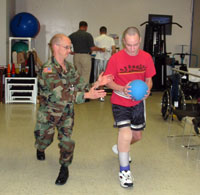
|
|
Matthew Scherer passes a ball to patient while running to increase strength and improve coordination.
|
My career goal is to stay in the Army and continue my education. I would like to have certification in neurological rehabilitation, and strength and conditioning coaching. I also plan to apply for graduate school through the military training opportunities. With a Ph.D. (doctor of philosophy) in physical therapy, I will be able to teach and train others.
When my time in the military is complete, and my children have grown up, my wife and I would like to work abroad again. It may be with the Peace Corps or an organization needing a therapist with experience with amputee patients
|
|
5. When I'm not working, I like to...
|
Back to Top

|
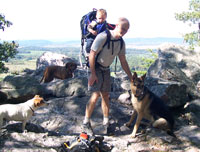
|
|
Mattew Scherer hiking with his son and dogs.
|
When I’m not working, I like to spend time with my wife and son. We love the out-of-doors and enjoy hiking with our dogs. Although I am very satisfied with my work in the hospital, my life would not be complete without opportunities to explore nature and learn new things.
|
|
6. In praise of a liberal arts program...
|
Back to Top

|
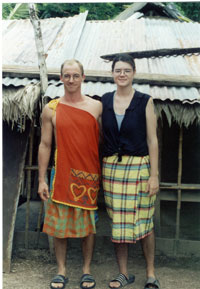
|
|
| |
Matthew Scherer poses with his wife in costume while serving in the Peace Corps.
|
I am an advocate for a liberal arts education. It develops a well-rounded individual who is able to communicate effectively and is ready to explore life’s many opportunities. Physical therapy training is possible regardless of your undergraduate degree. The prerequisites can be gained whenever the student is ready to focus on the goal. My advice to students is to see a lot, do a lot, and as a result, make a better career choice.
|
|
|
|
 |